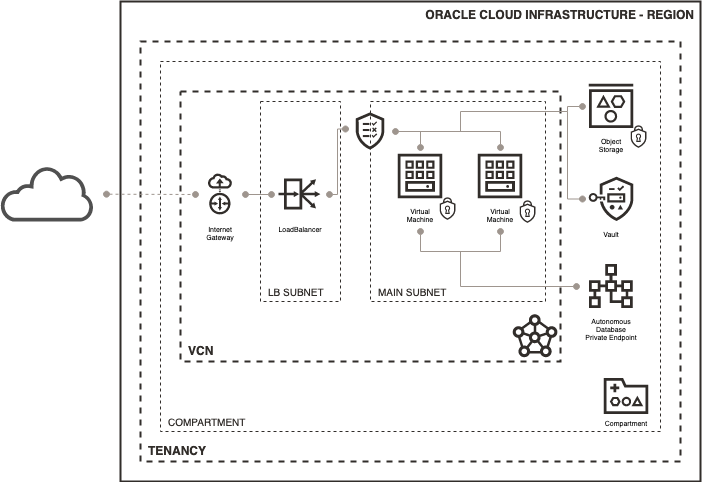We’re pleased to announce a new Quick Start solution that demonstrates a polyglot application on Oracle Cloud Infrastructure (OCI). Quick Starts are complete solutions that you can deploy quickly on your OCI Free Tier account or trial account. They let you try real solutions while learning about the services and capabilities in OCI. This Quick Start solution shows you how to use various infrastructure components in OCI to build and deploy applications quickly.
MuShop basic is a three-tier web application that implements an e-commerce site. It’s built to showcase the features of OCI. This application is designed to run using only the Always Free tier resources. The repository contains the application code and the Terraform code to create a Resource Manager stack, which creates all the required resources and configures the application on the created resources.
The solution
The Quick Start solution provides the automation to provision the resources required for the application in your tenancy. OCI supports several industry-standard resource management tools, such as Terraform and Ansible. In this Quick Start, you use Terraform to create and manage the Oracle APEX environment.
OCI provides a managed Terraform service called Oracle Resource Manager. This free service makes it easy for teams to work with Terraform by integrating directly with various source control systems, providing infrastructure automation and managing the Terraform state. Oracle Resource Manager can help package Terraform configurations as stacks, which create and manage infrastructure components in a user-friendly and wizard-driven manner. Developers can apply the same steps presented here to build their own stacks for easy, consistent, and repeatable deployments.
This Quick Start solution is open source, which enables you to use it as a sandbox or starting point for more complex deployments. The Terraform automation manages the components and is packaged as a reusable stack that you can later use to modify the topology and configuration. You can run the Terraform code published on GitHub in multiple ways. For a quick deployment, you can use the deploy button, which uses the Oracle Resource Manager. You can also choose to deploy the solution directly through the Terraform CLI in your development environment or in the Oracle Cloud Shell.
Expressing infrastructure as code using the methods described in this example gives you repeatability and consistency in your infrastructure and application deployments.
The solution architecture
MuShop is a microservices demo application purpose-built to showcase interoperable cloud native services on OCI and demonstrate several cloud native methodologies. The premise of MuShop is an e-commerce website offering cat products. It represents a polyglot microservices application, with actual use case scenarios for many OCI services. Each microservice in MuShop is designed to highlight its own or common high-level subject in OCI, using the context of the overall demo application.
This solution uses a subset of the services in MuShop and is designed to run on OCI using only Always Free resources. It uses MuShop source code and the OCI Terraform Provider to produce a Resource Manager stack, that provisions all required resources and configures the application on those resources.

The solution architecture is designed to demonstrate the use of several infrastructure components including basic networking components, databases, object storage, load balancing, compute instance configuration, and package provisioning.
Next steps
To learn more about the architecture, the automation tools and to build your own cloud native deployments, head over to the Quick Start GitHub repository. Here, we provide a “Deploy to Oracle Cloud” button that automates the resource creation and deployment process. You can also evolve your deployment to a full cloud native application composed of microservices deployed on Oracle Container Engine for Kubernetes (OKE) using MuShop Complete. The companion site on GitHub also offers a set-by-step guide on deploying MuShop and understanding how to use the various OCI services showcased in the demo application.
If you don’t already have an Oracle Cloud Infrastructure account, you can get started using either the Oracle Cloud Free Tier or a 30-day free trial, which includes US$300 in credits to get you started with a range of services, including compute, storage, and networking.